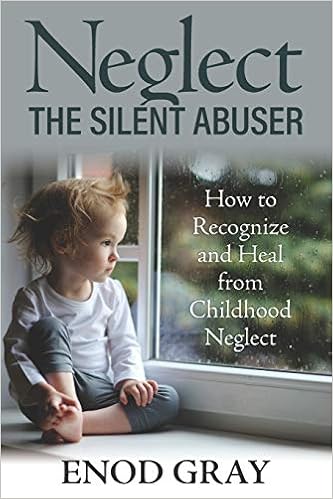How to Heal from Childhood Neglect: A Book Review

Respected psychotherapist Enod Gray has released Neglect: The Silent Abuser, an excellent primer for recognizing and learning to heal from the consequences of childhood neglect.
Most Don’t or Can’t Identify Childhood Neglect
Most people who come to therapy can recognize overt abuse. Overt abuse is abuse that is obvious to the person or a form of abuse that is easily recognizable.
For example, physical or sexual abuse, though frequently minimized, are often identified as abuse.
Verbal abuse people can, sometimes, have more difficulty recognizing. But, again, this type of abuse tends to be more overt. Think of a parent who also calls their child names or humiliates them consistently.
But What About Childhood Neglect?
Neglect is something most people have a harder time identifying.
Most people think more overt neglect, such as growing up lacking food, safe shelter, etc. Neglect most often brings forth thoughts of physical neglect.
Most people don’t immediately think of emotional neglect when they are asked about it, because, frequently, it’s not overt or consciously done. It’s also a form of neglect that is easy to minimize or rationalize.
Are you exploring your trauma? Do you feel your childhood experiences were detrimental to your current mental or physical health? Utilize this free, validated, self-report questionnaire to find out.

What is Emotional Childhood Neglect?
For example, if you grew up in a household with a parent with a mental illness, you may not have received the emotional care and nurturing you needed. However, this neglect was not consciously or intentionally done. It would have been a consequence of the parent’s mental illness and not, necessarily, consciously done.
As another example, if you grew up in a household with a sibling with a physical disability, this likely took up most of your parents’ time and energy. Likely there was some unintentional neglect in this family system. One family member needed more time and energy, therefore the children without those more overt needs are assumed to be just fine.
Addiction and Neglect
Addiction in one or both parents can also result in childhood neglect. If a parent is struggling with addiction, they won’t be able to meet their child’s needs for nurturance.
Frequently, we therapists also see neglect in families where one parent is a workaholic.
Again, this neglect is not something consciously done. It’s often justified by providing the children with all the material goods and experiences they could wish for. Unfortunately, children more often need time, not stuff.

Are you a professional looking to stay up-to-date with the latest information on, sex addiction, trauma, and mental health news and research? Or maybe you’re looking for continuing education courses?
Stay up-to-date with all of Dr. Jen’s work through her practice’s newsletter!
Vignettes of Childhood Neglect
Neglect: The Silent Abuser does a nice job of discussing the topic and its effect on our adult behavior. It does so at a cursory, but understandable level.
The factual information is nicely complemented by stories of clients of the author.
Often, it is these client vignettes that are most relatable to readers.
Light on Solutions
After addressing the process of neglect, Ms. Gray provides guidelines and thoughts on how to address the struggles of adults who grew up with neglect.
In this section of the book, I found myself wishing for more “meat.”
The thoughts and ideas are brief overviews of ways to help healing such as journaling, yoga, EMDR, and other forms of therapy.
Though wished for more tools for healing from this book, it is perfectly suited to those new to the concept of neglect as abuse in their own childhood. It feels like a primer for someone just starting their journey into recovery from neglect.
It also provides an excellent array of resources for further investigation. I would recommend this book to a client who wants a quick and easy read to serve as an introduction to the concept of neglect and the road to healing.

Do you feel your sexual behavior, or that of someone you love, is out of control? Consult with a professional.
Have you found yourself in legal trouble due to your sexual behavior? Seek assistance before the court mandates it, with Sexual Addiction Treatment Services.


Are you looking for more reputable data-backed information on sexual addiction? The Mitigation Aide Research Archive is an excellent source for executive summaries of research studies.
